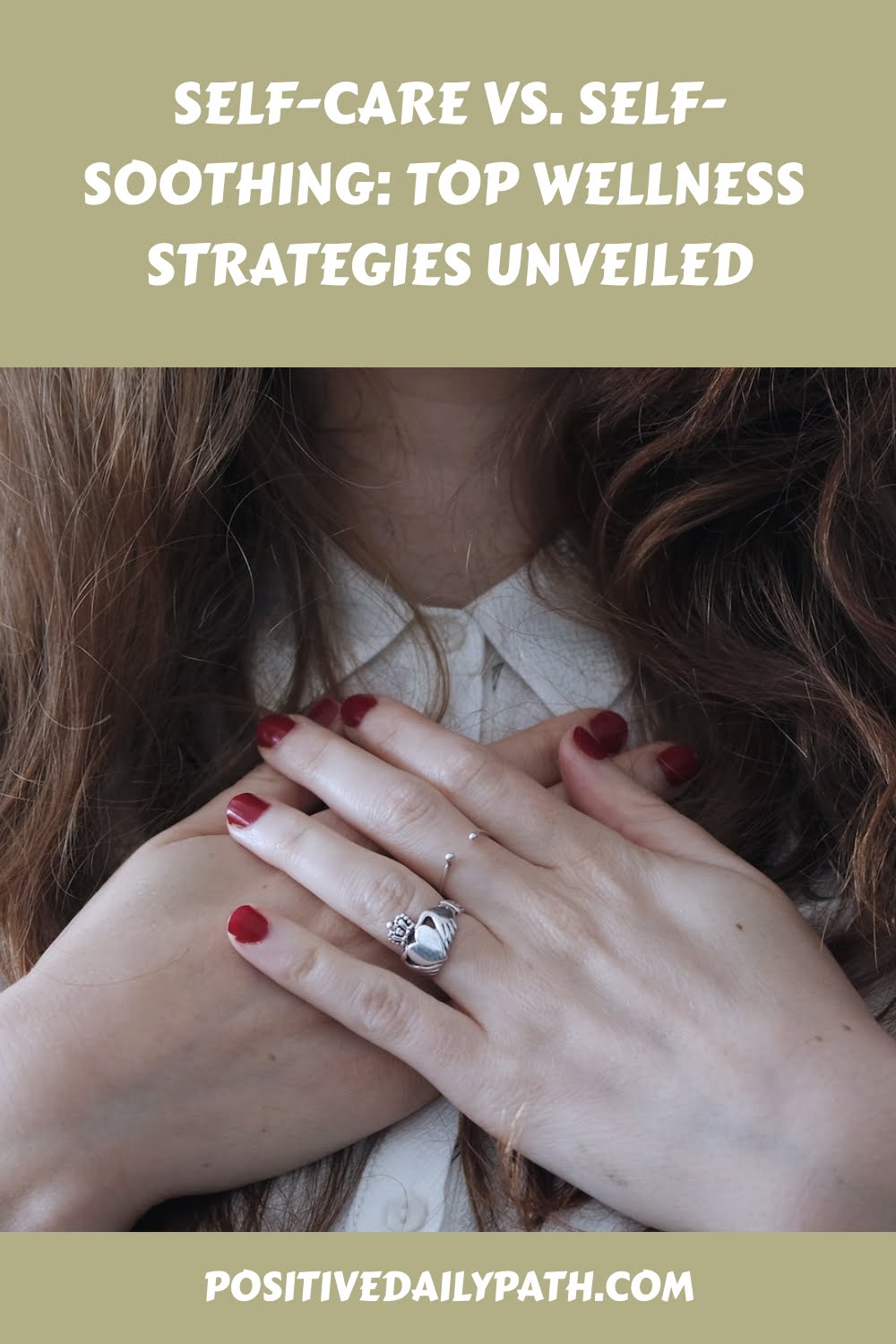Self-care and self-soothing skills are buzzwords that often get tossed around when discussing personal wellness, yet their distinctions are crucial in managing life's stressors through regular practice and activity.
Learning to effectively breathe is a foundational aspect of these techniques. It's about taking proactive steps for self care to improve your physical and mental health, incorporating self soothing practices.
Incorporating skills such as mindful breathing can be a crucial activity that helps manage and change the intensity of stress responses. Incorporating skills such as mindful breathing can be a crucial activity that helps manage and change the intensity of stress responses.
In contrast, self-soothing skills are about finding immediate relief—like turning down your body's emotional temperature for a hot minute, which can help in changing your care practices.
This post unpacks self care and self soothing concepts to help you carve out a space where relaxation and care practices aren't just occasional visitors but permanent residents in the order of your day-to-day life, enhancing your skills for maintaining well-being.
Understanding the Difference: Self-Care vs. Self-Soothing
Self-care and self-soothing are both crucial skills for well-being, but they serve different purposes in the Robinson method. Self care is about long-term health, while self soothing offers quick comfort, much like the skills taught by Robinson.
Routine Health Maintenance
Self-care is your health's maintenance crew. It's what keeps you running smoothly day after day. Think of self care like taking your car in for regular tune-ups to avoid breakdowns, honing skills for maintenance, and practicing self soothing to ensure smooth operation.
- Regular exercise
- Balanced diet
- Adequate sleep
- Stress management techniques
- Routine medical check-ups
Each of these self care actions contributes to a stable foundation for overall wellness, enhancing skills and self soothing techniques. Self care and self soothing require commitment and consistency, much like brushing your teeth or changing the oil in your car.
Immediate Comfort Measures
Now flip the script to self-soothing. This is about finding immediate self soothing relief when stress hits hard, ensuring essential self care. It’s grabbing a metaphorical fire extinguisher for self soothing when emotions flare up, a key aspect of self care.
- Listening to music
- Taking a hot bath
- Enjoying a favorite snack
- Watching a comforting show
These self care activities offer instant gratification and self soothing, calming the storm inside momentarily. They're like self soothing with a cozy blanket during a chilly evening – it's self care that feels great right then and there.
Long-Term Benefits
The benefits of self-care stretch into the horizon of your future. Self care and self soothing are investments that pay off over time, building resilience against life's curveballs.
- Improved physical health
- Enhanced mental clarity
- Stronger emotional stability
- Greater productivity
By sticking with self-care habits, you're likely to see improvements across many areas of life. By practicing self care and self soothing techniques, By practicing self care and self soothing techniques, It's about taking proactive steps for self care to improve your physical and mental health, incorporating self soothing practices.
Short-Term Relief
In contrast, self-soothing is all about now – easing discomfort or pain at this very moment without necessarily fixing underlying issues.
- Quick mood boosters
- Temporary distractions
- Momentary escape from stress
While self-soothing can be incredibly effective in reducing immediate distress, it’s not usually designed to address long-term problems or promote lasting change in one’s life.
Proactive vs Reactive
Think of self-care as setting up dominoes carefully so they fall just right; it's proactive planning for success and well-being.
On the other hand, imagine knocking over spilled milk with an elbow—that’s reactive—that's self-soothing. It happens in response to something that has already occurred rather than preventing it in advance, serving as a form of self soothing and self care.
Identifying Differences
Understanding these differences helps tailor personal strategies for self care and self soothing, managing well-being effectively.
- Recognize when you need quick comfort.
- Determine if there's an underlying issue needing more substantial care or if self soothing techniques may be beneficial.
Self-Care Strategies for Enhanced Well-Being
Self-care is essential for maintaining a balanced life. It's about taking proactive steps for self care to improve your physical and mental health, incorporating self soothing practices.
Regular Exercise Benefits
Exercise isn't just about getting fit or losing weight; it's a cornerstone of self-care. When you prioritize regular exercise as a form of self care, you're doing more than shaping up; you're practicing self soothing. You're giving your body the self care attention it needs to function optimally.
- Boosts Mood: Engaging in self care through physical activity triggers endorphins, making you feel happier.
- Improves Health: Consistent exercise lowers the risk of chronic diseases.
- Enhances Sleep: A good workout can lead to better sleep patterns.
Regular workouts can seem daunting at first. But even small changes, like a brisk walk or morning stretches, can make a huge difference.
Nutrition: A Care Staple
What you eat plays a critical role in self-care. Balanced nutrition is not about strict limitations or staying unrealistically thin. It's about feeling great, having more energy, and stabilizing your mood.
- Energy Levels: Whole foods over processed ones keep you energized.
- Mood Regulation: Nutrients from a balanced diet can improve mental health.
Eating well doesn't have to be boring. Try new recipes that include fresh ingredients and notice how much better you feel when you fuel your body right.
Sleep Schedule Importance
A consistent sleep schedule isn't just about avoiding grogginess; it's an integral part of self-care. Adequate sleep has been linked with everything from improved memory to lower stress levels.
- Better Productivity: A rested brain performs better throughout the day.
- Emotional Balance: Good sleep helps regulate emotions and reduce irritability.
Establishing a routine before bed can signal to your body that it's time to wind down. This might include reading or meditating — anything that tells your brain it’s time to rest.
Techniques for Effective Self-Soothing
Sometimes life throws curveballs, and it's crucial to know how to dodge them without getting hit. That's where self-soothing comes in handy, offering quick relief when stress levels spike.
Deep Breathing Exercises
Imagine your body is a balloon. Stress pumps air into it until you feel like you're about to pop. Here's where deep breathing steps in, letting out some of that air and deflating the tension.
- Inhale slowly through the nose, counting to four.
- Hold that breath for another count of four.
- Exhale through the mouth for a final count of four.
This simple technique can be a game-changer during moments of acute stress. Picture each breath as a wave washing over you, carrying away worries with every exhale.
Mindful Meditation Basics
Now let's talk about meditation. It's not just for monks or people with too much time on their hands – it’s a legit tool for everyone.
- Find a quiet spot.
- Sit or lie down comfortably.
- Focus on your breath or a mantra.
Meditation isn't about emptying your mind but rather acknowledging thoughts without judgment and letting them float by like clouds. It calms the storm inside your head faster than you'd think.
Sensory Strategies Unpacked
Our senses are like buttons that can instantly change our mood or feelings. Pressing the right one can bring instant calm.
Aromatherapy Impact
A whiff of lavender or peppermint might seem too good to be true for relaxation, but trust me, it works wonders.
- Light an aromatherapy candle.
- Use essential oils in a diffuser.
The scent molecules travel straight to the brain’s emotion center and work their magic there. It’s like having an off-switch for stress at your fingertips.
It's about taking proactive steps for self care to improve your physical and mental health, incorporating self soothing practices. Skills
In navigating life's challenges, it's essential to have a toolbox of strategies for managing our emotions and behaviors. Recognizing when to employ self-care techniques to rejuvenate or use self-soothing skills to calm and soothe ourselves is pivotal in maintaining balance.
Skills In navigating life's challenges, it's essential to have a toolbox of strategies for managing our emotions and behaviors. Recognizing when to employ self-care techniques to rejuvenate or use self-soothing skills to calm and soothe ourselves is pivotal in maintaining balance.
Choosing between self-care and self-soothing hinges on understanding your immediate emotional needs and long-term wellness goals. It's about knowing when to indulge in comfort or stick to routines that foster growth.
Assessing Situational Demands
Life throws curveballs. Sometimes, you're up against a wall, stressed out, and need something that'll calm you down ASAP. That's where self-soothing steps in.
- Grab a warm blanket.
- Listen to chill music.
- Sip some herbal tea.
But not all situations call for quick fixes. At times, what you need is self-care—a steady plan to keep your wellbeing on track.
- Regular exercise
- Healthy eating habits
- Consistent sleep schedule
It's like choosing between a band-aid and vitamins. One gives immediate relief; the other builds resilience over time.
Weighing Long-Term Goals
Think big picture. Your dreams aren't going anywhere, but they do need fuel to stay alive—fuel like self-care.
Imagine you're aiming for a promotion. You won't get there by just binging shows every night—that's soothing, not caring for future-you.
Self-care might mean:
- Learning new skills
- Networking with colleagues
- Setting professional targets
Sure, it takes more effort than chilling out, but it sets you up for success down the road.
Immediate Emotional Needs
Now flip the script. Maybe today was rough—you flubbed a presentation or had an argument with a friend. That's when self-soothing shines.
It's okay to hit pause on the grind:
- Take a hot bath
- Write in your journal
- Play with your pet
These actions are like hugs for your psyche—they don't build tomorrow's success but they patch up today's hurts so you can face tomorrow stronger.
Structured Routines vs Spontaneity
Life isn't black and white—it’s full of shades of gray (and every color imaginable). The same goes for managing our needs through structure or spontaneity.
Structured routines are great; they’re like train tracks guiding you towards your goals:
- Wake up at the same time daily.
- Follow a workout routine.
- Prep meals ahead for healthy eating.
But sometimes life calls for spontaneity—for breaking free from the routine:
- A surprise date night
- An impromptu road trip
- A last-minute concert with friends
The trick is balance—knowing when rigidity serves you and when letting loose does too.
Personalizing Your Approach: The Individualized Nature of Care Practices
Self-care and self-soothing are not one-size-fits-all. It's crucial to adapt these practices to your unique needs and life.
Tailored Activities
Everyone's got their own vibe. What chills one person out might stress another. You've gotta find what jives with you, whether that's painting, running, or just jamming to some tunes. Here's the deal:
- Hobbies: Love crafting? Make time for it.
- Exercise: If you're into yoga or lifting, do your thing.
- Relaxation: Meditation or a hot bath can work wonders.
Remember, it doesn't have to be fancy; it just has to work for you.
Unique Stressors
Life throws curveballs differently at each of us. Maybe your job is a pressure cooker, or family drama is like a never-ending soap opera. Recognize what gets under your skin so you can plan accordingly:
- Work Stress: Lunchtime walks could help you decompress.
- Family Tensions: Journaling might keep the peace in your head.
- Financial Worries: A budgeting app could ease money stress.
By pinpointing the chaos creators in your life, you can better block their punches.
Response Adjustments
Not everything will hit the mark right off the bat. It’s all about trial and error:
- Try something new like kickboxing or knitting.
- Give it some time; Rome wasn't built in a day!
- Not feeling it? Change it up without beating yourself up.
The goal is finding what sticks and rolling with those punches!
Effectiveness Monitoring
Keep tabs on how you're doing—like a self-care report card:
- Feeling more chill? Keep at it!
- Still stressed? Time for a tweak.
It’s about fine-tuning until the notes of your life play in harmony.
Encouraging Others Towards Better Self-Care Habits
Self-care and self-soothing are vital for maintaining our well-being. Fostering community support and providing resources can help people develop better self-care habits.
Community Support Systems
It's all about sticking together. When life throws a curveball, it's the support from those around us that can make all the difference. Think of it as a group huddle where everyone's got each other's back. It goes beyond just feeling good; it’s about creating an environment where everyone encourages one another to reach their wellness goals.
- Local health groups
- Online forums
- Wellness workshops
These aren't just buzzwords; they're lifelines that keep us floating even when we feel like sinking.
Model Positive Behaviors
Actions speak louder than words, right? Well,Showing is way better than telling. If you're nailing your self-care routine, you're basically a walking billboard for healthy living.
- Regular exercise
- Balanced diet
- Mindfulness practices
Your own habits could be the spark someone else needs to start their journey toward better health.
Resources and Guidance
We've all been there—overwhelmed with choices but underwhelmed with what works for us personally. The key is not to shove a one-size-fits-all solution down someone's throat but rather offer them a buffet of options tailored to their unique tastes in life.
- Personalized care plans
- Accessible mental health services
- Educational materials on wellness
Providing these tools can empower others to take charge of their own well-being without feeling lost at sea.
Appropriate Methods for Healthy Self-Soothing
When life gets tough, it's crucial to have strategies that help us cope without making things worse. The trick is finding ways to comfort ourselves that are safe and don't lead to bad habits.
Temporary Coping Mechanisms
Life throws curveballs. Sometimes, all we need is a quick way to dodge them and regain our footing. That's where temporary coping mechanisms come in handy. They're like those inflatable armband’s kids wear in the pool – not a solution for learning how to swim, but they keep you afloat when you suddenly find yourself in deep water.
- Take a bath: Slipping into warm water can be like getting a cozy hug from your bathtub. It's simple, it's soothing, and hey, it gets you clean too.
- Cold water splash: When emotions overheat, splashing your face with cold water cools down the mind as much as it does the body.
- Deep breaths: Inhale… exhale… It sounds cliché, but focusing on your breathing really does press pause on panic mode.
Avoid Harmful Relief
It's tempting to reach for what numbs the pain fastest. But quick fixes often come with strings attached – and they're usually more like chains. The key is recognizing these traps before we fall into them.
- Substances: Sure, they might seem like an escape hatch from stress, but substances are false friends that invite more trouble than they ward off.
- Harmful behaviors: From binge-watching shows until sunrise to overspending on retail therapy – if it hurts your health or wallet in the long run, steer clear.
Safe Comfort Choices
Safety isn't just about locking doors at night; it's also about choosing activities that lock out negative consequences. These choices should be comforting blankets, not straightjackets of dependency.
- Listening to music: Let melodies carry you away from distress without any baggage of addiction.
- Reading a book: Lose yourself in stories where problems resolve within pages rather than compounding yours.
- Hobbies and crafts: Creating something beautiful can remind you that there’s beauty in life beyond current struggles.
Fostering Without Dependency
Independence is power. And powerful self-soothing methods empower us without creating reliance on external crutches.
- Exercise: A jog around the block can clear your head better than any pill bottle ever could.
- Meditation or yoga: Stretching muscles or mindfulness skills strengthens inner resilience against outer chaos.
Integrating Practices into Daily Life for Stress Management
To manage stress effectively, integrating self-care and self-soothing into daily routines is essential. These practices can be scheduled throughout the day or incorporated into work breaks.
Regular Self-Care Scheduling
Self-care isn't a luxury; it's a must. Think of it as maintenance for your well-being. Just like you wouldn’t skip car services, don't skip on self-care. It keeps you running smoothly.
- Schedule “me-time” during the week.
- Use calendars or apps to remind you.
The trick is consistency. Whether it’s reading, yoga, or just chilling with music, make it a regular thing. Set aside time each day—even if it's just 15 minutes—to recharge and refocus.
Quick Self-Soothing Techniques
Stressful moments happen without warning. That's when quick self-soothing techniques come in handy.
- Practice deep breathing exercises.
- Listen to calming tunes between tasks.
Imagine you're in back-to-back meetings and feel overwhelmed—take five deep breaths before the next one starts. This brief pause can lower your stress levels significantly and prepare you for what's next.
Adapting Work Environments
Your workspace influences how you feel big time! It should be a place where both self-care and self-soothing can happen.
- Adjust lighting for comfort.
- Keep plants around to boost mood.
Maybe have an area to stretch or meditate during breaks. Or set up pictures that make you smile. Little changes can make your space more personal and relaxing, helping reduce stress while at work.
Balance Throughout Your Day
Balancing intense work periods with relaxation is key to managing stress effectively in our lives.
- Alternate between high-focus tasks and light activities.
- Take short walks after long sitting spells.
For example, after two hours of intense focus on a project, step away for a ten-minute walk outside. This shift helps reset your mind and body—preventing burnout and keeping energy levels up throughout the day.
Crisis Skills for Tough Times
When life throws curveballs—and it will—having crisis skills ready is crucial for bouncing back faster.
- Develop coping strategies beforehand.
- Recognize early signs of overwhelming stress.
If things get too intense at work or home, know what works best for you to regain control quickly. Maybe it’s calling a friend or stepping out for fresh air—whatever it is, practice these skills regularly so they’re second nature when needed most.
Example Success Stories
Real-life examples show that these practices are not just talk—they really work!
- People who take short meditation breaks report less anxiety.
Conclusion: Embracing Both Practices for Holistic Health
You've got this. Self-care and self-soothing aren't just trendy buzzwords—they're your power tools for crafting a life that's as resilient as it is joyful. Think of self-care as your long-term investment in health, with routines that keep you running like a well-oiled machine. On the flip side, self-soothing is your go-to first aid kit, ready to patch up those rough moments with comfort and calm. It's all about balance, right? You wouldn't hit the gym without stretching first, so why not pair up these practices to cover all bases?
Let's make it happen! Start weaving both self-care and self-soothing into the fabric of your daily life. Got a crazy week ahead? Schedule some ‘you' time—maybe a jog or a session with your favorite book. Feeling frazzled? Take five to breathe deeply or listen to tunes that lift your spirits. Remember, you're not alone on this journey. Share what works for you with friends; they might just need that nudge to prioritize their well-being too. Here's to stepping into a healthier, happier you—one soothing moment and one act of care at a time!
FAQs
What's the difference between self-care and self-soothing?
Self-care involves activities and practices that maintain your physical, mental, and emotional health over the long term. It's proactive and holistic. On the flip side, self-soothing is about finding immediate relief from distress or discomfort. It's like grabbing a cozy blanket when you're chilly – it feels good right then and there.
Can you give me examples of self-care?
Sure thing! Self-care could be hitting the gym for a workout, chowing down on a balanced diet, or getting enough shut eye each night. It's also about setting boundaries, chasing goals, and sometimes just saying no to stuff that drains your battery.
Discover Why Self-Care is So Important for Your Overall Well-being!
Remember, self-care isn’t just a luxury—it's a vital part of your journey, fueling your growth and empowering you to reach the heights of your potential!
How about some common self-soothing methods?
We're talking bubble baths, binge-watching your fave series, or devouring a pint of ice cream. Self-soothing is all about those feel-good vibes in the moment – like wrapping yourself up in a burrito of blankets when life’s got you feeling like a human pinball.
Is it bad to self-soothe?
Nah, not at all! We all need to hit the chill button sometimes. But here's the deal: if you're always reaching for quick fixes without tackling the root issues, it might be time to mix in more self-care hustle. Balance is key!
How do I know if I'm dedicating enough minutes to practice self-care skills and behaviors?
Listen to your body and mind – they’re chatty fellas. If you're constantly run down or stressed out even after some solid downtime, your self-care game might need leveling up. Think long-term strategies over quick fixes.
When should I choose self-care over self-soothing?
Go for self-care when you want to build resilience and handle life’s curveballs like a pro. Choose self-soothing when you've had one heck of a day and need an instant pick-me-up. Remember though – don't let those comfort habits become your only go-to.




